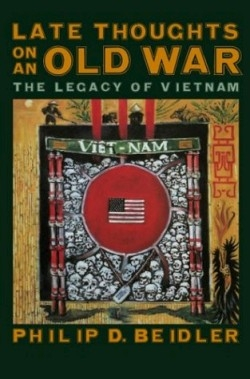Late Thoughts on an Old War
The Legacy of Vietnam
An armored cavalry platoon leader in Vietnam, the author has spent much of the thirty-five years since then coming to terms with what the war meant to him emotionally, and what its cultural and historical legacy has been for America.
Beidler writes these compelling essays with a sense of urgency, because he knows that the war is receding into American history as the baby boomers who fought it are aging. His powerful language and raw, to-the-point style reveal the anger and despair of soldiers who served and felt betrayed by their government and fellow citizens.
The author describes the death of a young boy killed by a piece of concrete knocked off a gate by an American tank.
This death disturbed him more than any other. It was as meaningless as the government’s response to it. The boy’s parents were paid a Solatium, a set price for the worth of a family member killed accidentally. This child, under age fifteen, was worth $14.40.
Beidler observes that “the policy must have once been the kind of thing a McNamara, a Bundy, or a Rostow could have cooked up in a memorandum and then slept better knowing about.”
Not all of the fighting in Vietnam was between Americans and South Vietnam and Communist forces. Tensions between whites and African-Americans escalated into race riots and murders of hated officers. Although the military was traditionally a means of social mobility for African-Americans, racial discrimination and assignment to the most hazardous duties in Vietnam led to instances of explosive rage, which reflected life in the States in an era where diversity was not recognized and sensitivity training did not yet exist.
Two essays discuss the impact of films on the war. President Nixon admired the movie Patton, says Beidler, and George C. Scott’s portrayal of the charismatic general may have emboldened
the president to invade Cambodia and to publicly call the students killed at Kent and Jackson State Universities “bums.” Another two essays cover the music and pulp fiction novels of Vietnam; these are informative, if less interesting.
Arguably the most searing essay is about Lieutenant William Calley, who led his platoon on the murderous rampage of My Lai 4 village in 1968, which resulted in the deaths of approximately five hundred women, children, and old men. Beidler is not concerned about coming to terms with Calley, who is alive, but with “Calley’s ghost.” His ghost has become identified with every Vietnam veteran, Beidler states. He is haunted by the thought that any enlisted man could have been assigned to Calley’s platoon and acted with the same brutality.
Beidler, a professor of English at the University of Alabama, has written and edited several books on history, war, and literature; he has published articles and essays in a variety of literary journals. His article “Solatium” in the Michigan Quarterly Review won the 2003 Pushcart Prize.
In this book, he presents a collection of important and forceful works.
Reviewed by
Karl Helicher
Disclosure: This article is not an endorsement, but a review. The publisher of this book provided free copies of the book to have their book reviewed by a professional reviewer. No fee was paid by the publisher for this review. Foreword Reviews only recommends books that we love. Foreword Magazine, Inc. is disclosing this in accordance with the Federal Trade Commission’s 16 CFR, Part 255.

